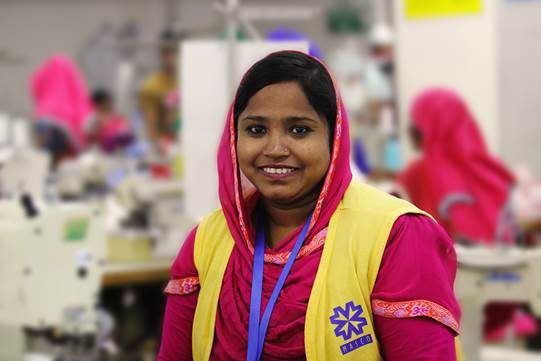The concept, principles and benefits of social dialogue are much discussed amongst industrial relations practitioners, but rarely do we hear directly from workers who are putting those principles into practice. In this article, trade unionist Sumi Ahkter tells her story to Shoeb Mahmud, Social Dialogue Coordinator with the Bangladesh Ethical Trading Initiative.

Sumi Ahkter is employed by the MASCO Group based in Gazipur in Bangladesh, a large manufacturing group employing about 16,000 people. In many respects, she’s very similar to many other young women employed in the country’s ready-made garment sector. But Sumi is also very different. That’s because she’s the president of one of the company’s trade unions, Masco Industries Concept Knitting Ltd Workers Union.
Sumi’s background is like that of most other women garment workers. It means battling to survive ever present poverty. It also entails struggling to meet family demands, which in Sumi’s case was initially in the context of an abusive and unhappy marriage. Yet, despite resistance from her husband, Sumi was determined to work to improve her life.
In 2003 she started to do just that. “I began my career as a folder in a spinning mill with a basic monthly salary of BDT.930,” says Sumi. “With overtime I earned BDT.1300 per month.” As her skills increased, Sumi moved to other companies, increasing her wages as she went. “It was in 2008 that I took a position as a folder at MASCO, where I still work,” she says. “I was happy with my new job. My wages had increased, and I was becoming independent. But I wanted to do more.”
After two years, Sumi was approached by the factory welfare officer and was asked to join their Workers Participation Committee (WPC) in 2010. She felt this might be the “more” that she wanted and became its vice chair. However, the Committee was inactive and her appointment coincided with a time when workers were being retrenched and had many grievances. “I felt powerless and could only advise my fellow workers to report their grievances to management, but I couldn’t see any change,” she says. Sumi was frustrated at the lack of progress in resolving disputes. But she wasn’t sure what to do to turn that around, particularly as people were losing their jobs.
However, as with countless thousands of other workers, life was to change fundamentally in 2013 following the Rana Plaza tragedy – the factory complex collapse that killed over 1,000 workers and injured many more. Sumi recalls the shock that reverberated across the country and the subsequent thirst for more knowledge and for greater worker empowerment. Crucially, Rana Plaza also galvanized her.
“At the time I remember seeing a news report of the USA asking that trade unions be established in all Bangladeshi factories,” she says. A fellow worker asked for help in forming a trade union in the factory and Sumi stepped up. Together, they organised a 600-member trade union, which was formally inaugurated on January 2, 2014 and she became its president. Sumi recollects that the union initially met with resistance and management threats but, she says, “we stood firm against any intimidation.” Meanwhile, they accessed training from the Solidarity Center which helped them better understand their roles.
Yet, soon after there was union unrest at another of the MASCO Group factories. Union and management relations sunk to an all-time low. “We faced considerable challenges,” Sumi says wryly, “and we were struggling to move forward.” It was then that Sumi, in her role as president of the union, and MASCO factory management were approached by the Norwegian brand Varner (which buys garments from MASCO) and representatives of the Joint Ethical Trading Initiatives (JETI) of Denmark, Norway and the UK. The Varner and JETI request was unexpected but welcome – that the union and management participate together in extensive training on the principles and practical implementation of workplace cooperation and collective bargaining, which JETI representatives explained would be mutually beneficial.
The training took time and was initially alien to both parties. It meant both sides having the courage to build trust and to put aside pre-conceived ideas and notions. But it has proved to have positive benefits for both the business and for workers. “Through the JETI workplace cooperation and collective bargaining training, trade union members and management were able to understand the value of dialogue and we have been better able to solve problems,” Sumi says.
Sumi explains that the company and union have embarked on a number of joint initiatives and have agreed on improved terms and conditions in the workplace environment through collective bargaining. “The festival bonus has increased from 45% of gross to 62%,” she says, “and there’s now no dispute about ensuring maternity benefits are paid in line with legal requirements.” Other initiatives include a yearly company picnic and better attendance bonus.
Now, both the company and union are strong advocates for workplace sound industrial relations and host many visitors to the plant. Sumi and company managers speak together on public platforms and events to promote their positive journey from conflict to collaboration. None of this, Sumi claims, would have been possible within an environment of confrontation, mistrust and hostility. “We’ve reached a consensus,” she says. “Social dialogue should always be the first option, rather than strikes. Solutions must draw on collaboration, not confrontation.”
|
Involved Global Deal Partners
|
Useful links |